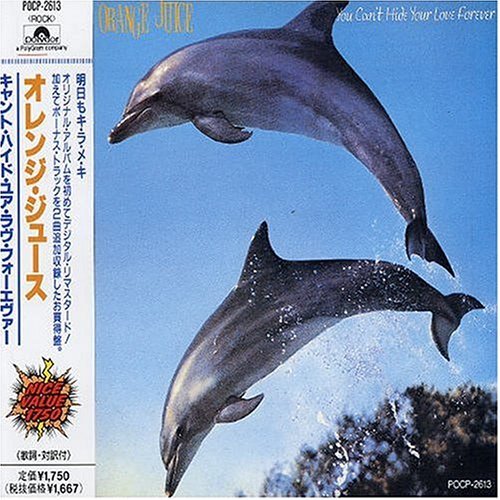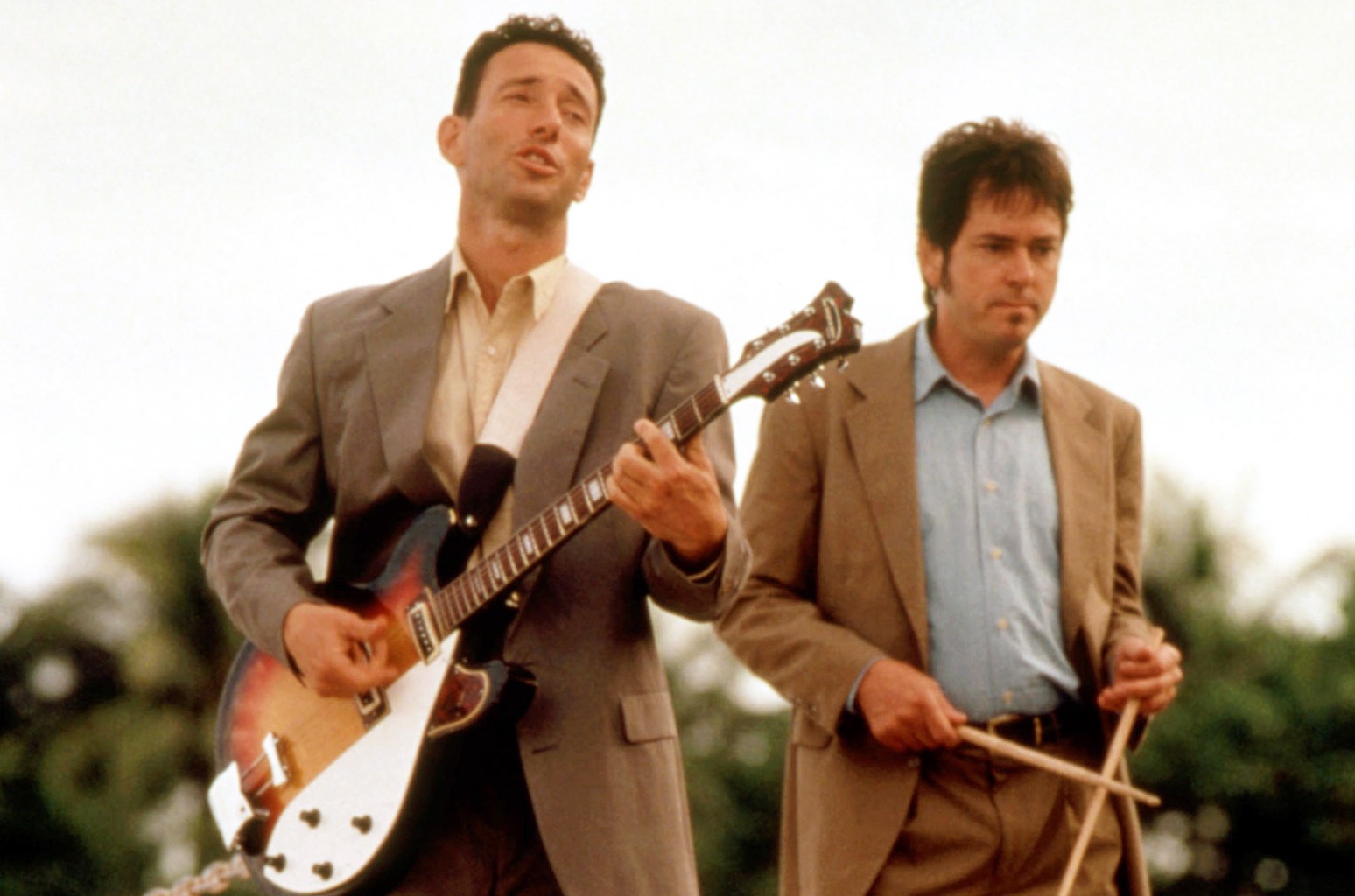
Article par Mazz
ENGLISH VERSION
(french below)
Orange Juice are not your typical Who/Beatles/Kinks influenced mod revival clone bands. It’s fun to try and fit Orange Juice into a neat musical category because the album You Can’t Hide Your Love Forever (1982) seems to straddle so many genres. It’s punkish because the vocals are strange and somewhat raw, and some songs are damn fast and feature interesting rhythmic changes throughout, at other times its pure guitar driven power pop yet sharp and completely facetious. Should the seemingly genuine crooning that echoes from the poppy songs on this album be viewed suspicious simply because the words are funny? Is it okay to like music that doesn’t it take itself serious? Does Orange Juice fit into the category? What the hell, is this what “post-punk” is supposed to be?
One listen to the album and you can immediately hear where bands like Franz Ferdinand and their early 2000’s “dance-punk” ilk got their inspiration (well… along with Gang of Four, and the Rapture, and Moving Units and anything else on the Rough Trade and Fast Records comps). Tracks like “Tender Object” and “Consolation Prize” are the kind of dancy genre-melding “post-punk” tracks that sound just like this. These two tracks are particularly great because they bring together the musical genres featured on the album without being overly ambitious about it.
The principal songwriters of this album Edwyn Collins and James Kirk (Beam Me Up!) made one hell of a fantastic record. Kirk’s guitar playing is certainly more eclectic and sounds tighter than his early 80’s pop-rock peers. As the rhythm section holds it the fuck down the guitar matches gloriously to the funky white boy grooves on this record, which I must admit are slick and very enjoyable (check out “Satellite City” and “Wan Light“). Although at other times the guitar also reminds me of Andy Gill’s guitar tone on Entertainment! except more consciously melodious, which isn’t necessarily a bad thing, there is something refreshing about listening to a late 70’s to early 80’s punk era record that was crafted by genuinely skilled musicians.
The lyrics are thoughtful and refreshingly sarcastic throughout the album. On songs like “Falling” and “Laughing” and “Upwards” and “Onwards Edwyn Collins’” quivering vocals are quirky and have a Morrissey-esque quality that doesn’t come off as serious or pretentious. Sort of like if Morrissey toned down the vocal emoting, had some voice professional lessons and became momentarily possessed by David Byrne. This is cool because it brings a certain playfulness and intelligence to the music that differentiates it from a great deal of political, emotional, and nonsensical shit that was popular in that era.
Among the funky beats and off-kilter crooning there are also some gorgeously honest ballads like Untitled Melody. When you get up to shake to the funky tunes on this record you should also pay attention to the eclectic instrumentation on some of these tracks. “Wan Light“, “L.O.V.E. Love“, and “Three Cheers for Our Side” feature horns and background singing that could have been straight up lifted from a late 60’s soul record. While it was not entirely unusual for early 80’s pop bands to feature soul style instruments and background vocals, I get an eerily beautiful soul vibe from this record that is entire distinct from blue eye’d soul because the vocals are so mismatched to the genre.
After listening to this record its obvious that it does not matter how you categorize You Can’t Hide Your Love Forever. No matter what you call it, it forever will be a killer album that can make anyone dance, laugh and have a good time. If you check out this record, I can promise you will do all three!
(mp3) Orange Juice – Consolation Prize (1982)
(mp3) Orange Juice – Falling And Laughing (1982)

————
FRENCH VERSION
Orange Juice n’est pas l’énième groupe revival des Who, des Beatles ou des Kinks. Il est difficile de faire entrer le dernier album d’Orange Juice, You Can’t Hide Your Love Forever (1982), dans une catégorie précise tant il est à la croisée de nombreux genres. C’est punk-ish parce que les voix sont brutes et étranges, que certains titres sont super rapides et qu’ils contiennent de nombreux changements de rythme. D’autres fois, la musique est menée par une guitare très Power Pop qui, bien que facétieuse, ne perd pas en efficacité. Doit-on alors considérer comme suspect cette voix de crooner qui hante l’album simplement parce que les paroles sont drôles ? A-t-on le droit d’aimer de la musique qui ne se prend pas au sérieux ? Est-il possible de catégoriser Orange Juice ? Et puis, qu’est ce que le ‘Post-Punk’ est censé être après tout ?
L’écoute de cet album révèle avant tout ce qu’a été la ‘dance-punk’ du début des années 2000′, que des groupes comme Franz Ferdinand représentaient alors (et puis… Gang of Four avant eux, et puis… The Rapture, et puis… Moving Units, et puis… ce que produisait Rough Trade, et puis… les compilations de Fast Records). Les titres “Tender Object” et “Consolation Prize” illustrent parfaitement ce mouvement musical sans être trop ambitieux pour autant.
Peu importe la façon dont on catégorise Orange Juice, Edwyn Collins et James Kirk (Beam Me Up!) ont composé un album en tout point fantastique. Le jeu de guitare de Kirk est très certainement plus éclectique que ceux de ses pairs Pop Rock du début des années ’80. Tout le rythme de cet album est induit par une guitare qui fait sérieusement penser au White Boy Grooves, ce qui, avouons le, est très jouissif (à ce titre, allez écouter “Satellite City” et “Wan Light“). D’autres fois, le son de la guitare me rappelle celui d’Andy Gill sur l’album Entertainment! de Gang of Four. Mais celui d’Orange Juice est assurément plus mélodique, ce qui ne peut qu’être encensé. Cette musique parvient en somme à nous rappeler ce qu’était la Punk era de la fin des années ’70.
Les paroles sont réfléchies et sarcastiques. Des titres comme “Falling“, “Laughing“, “Upwards” et “Onwards Edwyn Collins’” font place à la voix tremblante d’Edwyn Collins et on se rappelle alors les grandes heures de Morrissey, un peu comme ci ce dernier avait pris quelques cours de chants et était momentanément possédé par David Byrne. Cela apporte une certaine espièglerie à You Can’t Hide Your Love Forever qui différencie cet album de tout ce ramassis politique qui était si populaire à l’époque de Morrissey.
Au milieu de nombreux rythmes funky et très crooner se trouvent aussi quelques ballades tout à fait sincères, à l’image de “Untitled Melody“. Et puis, il faut noter à quel point l’instrumentalisation est éclectique. “Wan Light“, “L.O.V.E. Love“, et “Three Cheers for Our Side” laissent place à du Cor tandis qu’un chant délivre en fond une mouvance finalement très sixties. Il n’était certes pas inhabituel pour les groupes des années ’80 de laisser place à quelques chorus, mais on trouve ici une âme véritable à des chants qui se distinguent de ceux précités, principalement à cause de leur côté anachronique.
L’écoute de cet album nous pousse à l’évidence : il s’agit d’un album splendide qui ferait danser, rire et passer du bon temps à n’importe qui. Tentez l’écoute et vous verrez par vous-même.
(mp3) Orange Juice – Consolation Prize (1982)
(mp3) Orange Juice – Falling And Laughing (1982)



 Orange Juice – Consolation Prize
Orange Juice – Consolation Prize
Post a comment